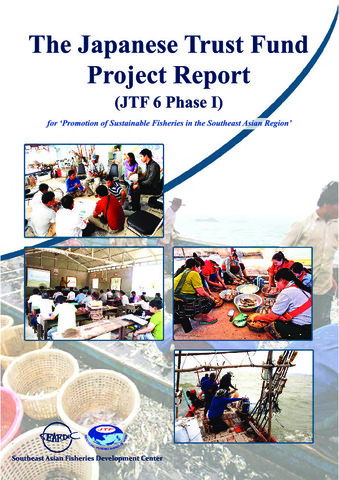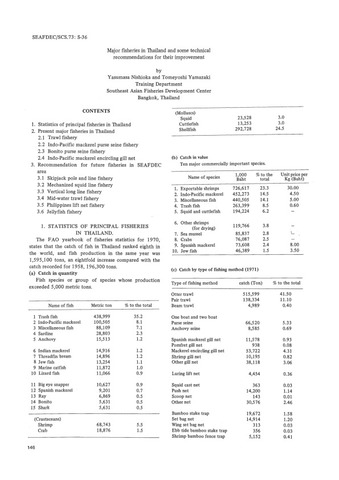The Japanese Trust Fund Project Report (JTF6 Phase I) for Promotion of Sustainable Fisheries in the Southeast Asian Region

រកមើល / បើក
Downloads: 324
កាលបរិច្ឆេទ
2020អ្នកនិពន្ធ
Page views
1,228ទិន្នន័យមេតា
មើលកំណត់ត្រាលម្អិតនៃធាតុ
Share
អរូបី
Since 1998, six phases of the Japanese Trust Fund (JTF) program have been implemented in the Southeast Asian region at SEAFDEC, and a number of activities carried out by the SEAFDEC Secretariat and Departments had been completed resulting in developed fisheries and aquaculture technologies which were transferred to the Southeast Asian countries through enhanced capacity building, as well as policy recommendations and guidelines that were used by the countries to revise their respective laws and
regulations for the sustainable development of their fisheries.
The project activities under the JTF6 Phase I from 2013 to 2019 were carried out in the region in line with the Resolutions and Plans of Action for Sustainable Fisheries in the ASEAN Region that were adopted during the ASEAN SEAFDEC Conference on Sustainable Fisheries for Food Security Towards 2020 "Fish for the People 2020: Adaptation to a Changing Environment" in June 2011
as not only SEAFDEC projects but also ASEAN projects under the Fisheries Consultative Group of the ASEAN-SEAFDEC Strategic Partnership (FCG/ASSP) mechanism to strengthen common goals on sustainable fisheries development for food security and poverty eradication.
During the JTF6 Phase I, a number of common policies and guidelines were developed and adopted by ASEAN as well as training activities for ASEAN Member States and R&D of fisheries and aquaculture technologies were implemented. The significant achievements through the implementation of the various projects funded by the JTF6 Phase I are summarized in this document.
SEAFDEC has been successful in transforming the status of the region's fisheries from being production-oriented to sustainability. In the past 20 years, fisheries production from the Southeast Asian countries has continuously soared higher making the region as one of the most reputable in terms of fisheries production. SEAFDEC will continue to foster the mainstreaming of the policies and findings in fisheries and aquaculture that emanate from the activities to be conducted under the JTF6 Phase II program started from 2020 in the ASEAN context for sustainable development of fisheries in the region.
Suggested Citation
SEAFDEC. 2020. Japanese Trust Fund Project Report (JTF6 Phase-I). Southeast Asian Fisheries Development Center, Bangkok, Thailand. 194 pp.
ប្រធានបទ
បណ្តុំបណ្តុំ
Related items
Showing items related by title, author, creator and subject.
-
The Status of Fisheries in the Republic of Maldives
Faiz, Mohamed (Training Department, Southeast Asian Fisheries Development Center, 1997)The paper discusses the tuna fisheries in Maldives which dominates its fishing industry. Apart from a very strong domestic market, tuna is also the main export commodity of the country. Moreover, reef fisheries such as, ... -
Major fisheries in Thailand and some technical recommendations for their improvement
Nishioka, Yasumasa; Yamazaki, Tomeyoshi (Japan International Cooperation Agency, 1977)Presented in this paper is the development of fisheries industry in Thailand. The data on the production of the principal fisheries species and major fishing methods are also presented. Also included are the recommendations ... -
Status of Fishing Conditions in Cambodia
Sour, Kim; Vuthy, Ros (Training Department, Southeast Asian Fisheries Development Center, 1997)Fisheries in plays a very important role in Cambodia’s national economic development. Total fish catch production in 1996 was 104 310 tones, about which 60% was contributed by inland capture fisheries, 30% by marine capture ...



